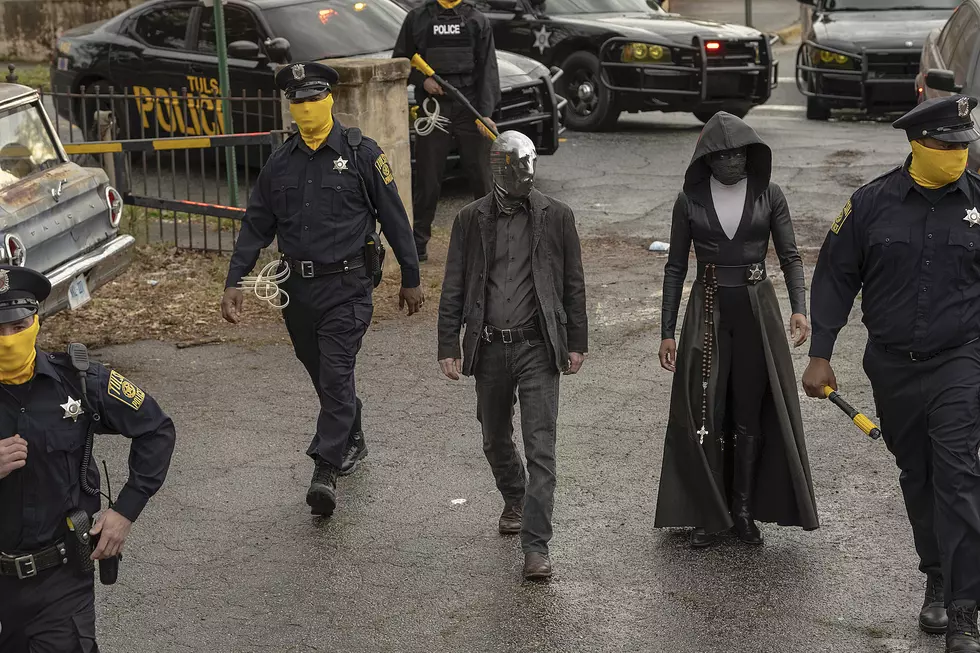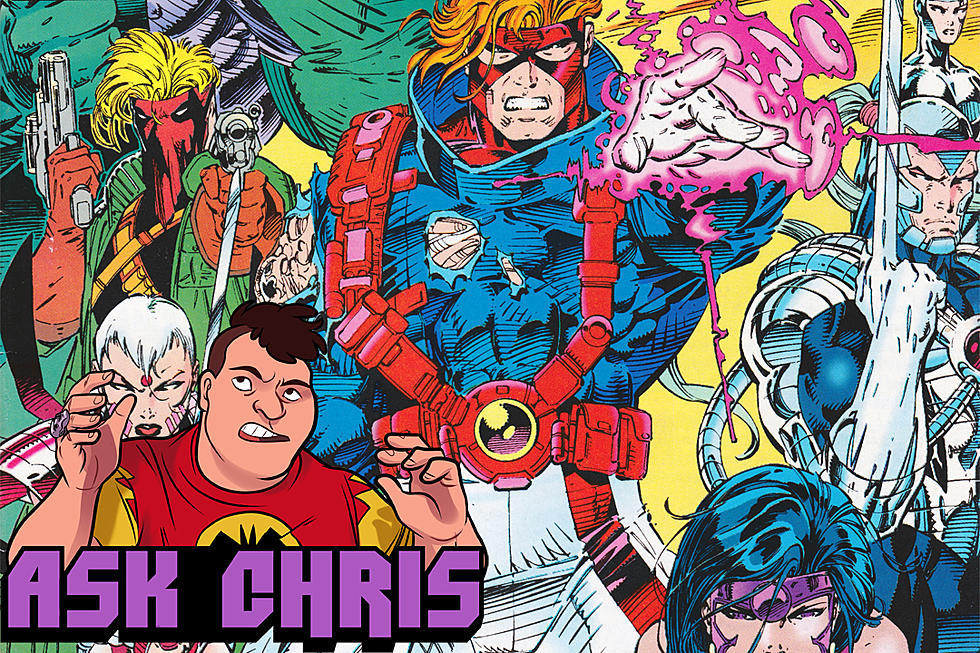
Alan Moore x Hideaki Anno: Their Failed Assassinations of Their Genres

When you're at the top of your game, sometimes you burn out. Sometimes you freeze up. Sometimes you fade away. And sometimes you poison the well and drop the mic.
On the flipside of my last parallel between a Western and Eastern creator, Grant Morrison and Naoki Urasawa, I'm flipping it around to look at two incredibly polarizing and far less optimistic figures: Watchmen and League of Extraordinary Gentlemen scribe Alan Moore and Evangelion and Gunbuster creator/writer/director Hideaki Anno: two men who tried to change their creative fields in one direction, and instead caused a chain reaction that moved everything far, far, far in the other.Today in 2011, the two men have found themselves at very different endpoints: Alan Moore is already the Grand Wizard of Northampton, dividing his time between literary fanfiction, Cthulhu rape fantasies, blasting the industry that keeps him paid, actually doing very commendable public works, and avoiding anything to do with Watchmen as much as humanly possible. Hideaki Anno, on the other hand, is painstakingly revisiting, remaking and possibly doing a sequel (at the same time!) for his own magnum opus Neon Genesis Evangelion, tweaking and perfecting it after a lengthy absence from the entire anime industry.
But despite their diverging path, Moore and Anno once had a lot in common as two genre heavyweights who created definitive works, grew dissatisfied with their respective industries, and retreated from the commercial mainstream. Watchmen and Evangelion share a lot in common -- while there's a solid argument to be made that Watchmen is more literary, Evangelion tore down the giant robot genre just as harshly as Watchmen tried to expose superheroism as a sham.

Watchmen was Moore's seminal 1986 twelve-issue miniseries with Dave Gibbons, which featured highly modified versions of the Charlton Comics lineup. The book sought to humanize the concept of superheroes and eventually expose them as moral absurdities, ending with billionaire and former superhero Ozymandias (SPOILER) manufacturing an alien squid monster powered with the brain of a psychic boy and teleporting it into New York to fake an alien attack that destroys half the city and forces the end of the Cold War. The only actual superhuman in the book flies off into space because he's stopped caring about humanity, and basically the concept of the superhero ends, exposed as a farce.
Evangelion takes the standard arc of the giant-robot story -- boy finds giant robot, learns bravery and friendship, triumphs over evil -- and subverts it entirely into a polemic on the psychological damage caused by self-imposed isolation, a theme Anno expected to resonate with the shut-in otaku crowd that makes up so much of anime fandom in either hemisphere.

Instead, Moore got drunk-driving Hal Jordan and the revitalization of the superhero industry, and Anno got body pillows made of the character he created to criticize the fetishization of young girls. If artistic expression is a form of magic, both of these guys rolled goose eggs and failed their saving throws against douchebaggery. Not only did Watchmen and Evangelion not achieve their goals, they actually achieved the exact opposite, leading to an era of dark, "realistic" superheroes on one hand and building an otaku-pleasing merchandising empire with the other. Both works are perennial sellers and towering franchises, beloved by many for what their creators would probably think to be the "wrong" reasons.
While Moore did some more work for DC Comics after the publication of Watchmen -- including the almost comically dark Joker story The Killing Joke -- he soon left the company after a disagreement regarding the rights to Watchmen, spending most of the '90s doing superhero work for Jim Lee or Rob Liefeld and independent books like From Hell. While all of these books were critical successes, none of them came close to the popular or critical impact of Watchmen. It was a game-changer -- just not in the way that he wanted.
Meanwhile, Anno experienced a torturous relationship with Evangelion fans as the show focused less and less on the whizbang robot fights and more and more on psychoanalysis mixed with religious imagery where a dude worked out his depression by having an acid trip inside a robot, the fans obviously got more and more vocal. When the final two episodes implied all of the actual action in the dialogue and took place entirely inside the heads of the main characters due to budget problems, they practically went nuts with frustration.

However, while Moore's response to people misunderstanding his work was to step away, Anno was to instead give them what they want -- but in such a way that it hammered home his polemic even more. The film End of Evangelion was a dark, brutal, psychedelic orgy of sex and violence that culminated in the mass extinction of humanity set to an optimistic J-pop song with lyrics about suicide. The themes of the television show criticizing the audience for being spineless and lost in a fantasy world were cranked up to eleven, as the protagonist Shinji basically watches everybody die around him due to his refusal to make any effort whatsoever to engage with other people.
After that business, he directed over half of Kare Kano -- an adaptation of a lighthearted romantic comedy manga, for a total change of pace - before getting into a fight with the manga author and bailing both the show and Gainax in a huff to go off and do live-action movies, including one about the horrors of teenage prostitution -- probably a vehicle less likely to be misunderstood than giant robot anime originally aired in a children's timeslot.

Eventually, both creators returned to their original companies -- Moore against his will, since he'd signed up with Jim Lee's WildStorm comics to do the America's Best line right before WildStorm got bought out by Detective Comics Comics. Anno came back to Gainax to do, perplexingly, a live-action adaptation of Cutie Honey, before leaving yet again to start his own studio and... completely retell Evangelion in a new series of films called Rebuild of Evangelion.
The new Rebuild movies are part retelling and part maybe-timeloop-sequel-who-knows, with each film so meticulously touched and retouched after release that they've got version numbers. Where Moore continued to create new concepts and distance himself as far from Watchmen and his legacy as he possibly could, Anno just couldn't stop pounding away at the same story, resculpting and remolding it, perhaps thinking that maybe this time the audience will finally get what the Hell he's trying to say and stop playing pachinko machines and buying canned bread branded with his characters.
However, as much as their careers post-definitive-work have differed, Anno and Moore are both essential creators of hugely important works that tried to carefully assassinate their respective targets: the otaku culture/lifestyle and the dominance of the superhero comic. Both were stymied in their quests by creating works that, rather than killing their subjects, were hailed as celebrations that enabled the worst excesses of everything they sought to avoid. Both turned away, embittered, from the majority of the industries that they had developed and flourished in creatively. Both -- like Ozymandias at the end of Watchmen and Shinji at the end of Evangelion -- now stand alone, either revisiting past glories (albeit to very lucrative effect) or distancing themselves from them entirely, self-imposed exiles and pariahs, victims of their own artistic intent.

WRITER'S NOTE: The majority of the discussion of Anno comes from Wikipedia sources or other apocryphal documents, due to the complete dearth of conversations with him conducted in, or printed in, English. Thanks to the (ironically named) EvaOtaku.com for their look at his work after Evangelion. Any corrections, conformations or other feedback would be appreciated.
More From ComicsAlliance









